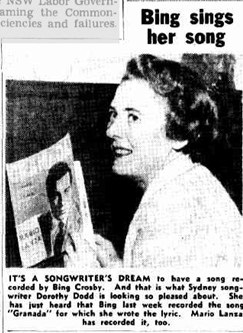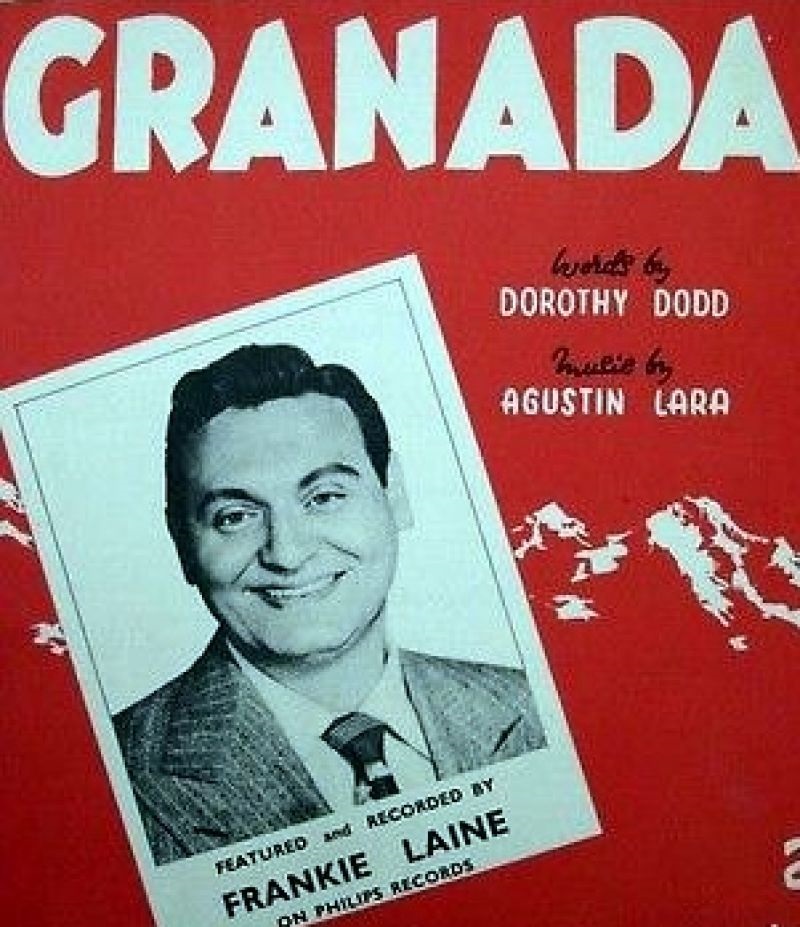Image right: Dorothy Dodd. The Bulletin 23 June 1954 p.18 https://nla.gov.au/nla.obj-528031191/view?sectionId=nla.obj-533955405&partId=nla.obj-528078918
March is Women’s History Month!
This year we celebrate the career of lyricist, Dorothy Dodd of Strathfield. Born in Burwood, Dorothy grew up at Maritana, 199 Elizabeth Street Croydon and studied at the Conservatorium of Music. Her first song, Rainbow of Dreams was published at age 20 in 1942. A pianist as well as a songwriter, Dorothy first came to attention as a regular member of The Youth Show radio broadcasts which featured the talents of young Australian performers. Although she also worked as a private secretary, by 1943 the electoral roll listed her occupation as composer.

The Wireless Weekly Vo.37 No.32 15 August 1942
https://nla.gov.au/nla.obj-718852888/view?sectionId=nla.obj-722512589&partId=nla.obj-718860093#page/n16/mode/1up
On 23 September 1944 Dorothy married Laurence Beverley Winslow Knight at St Andrew’s Anglican Church in Summer Hill and the couple settled at 3 Glenarvon Street Strathfield. A newer house now stands on this site. Dorothy continued to compose under her maiden name.
In 1950 her musical comedy was performed at Ashfield Town Hall for the first time by a company of amateurs. Although not entirely complimentary, The Sydney Morning Herald reported that the entertainment ‘shows that Miss Dodd has a rare facility in turning out tunes that could quite easily take the popular fancy. Hers is a noteworthy talent.’ [1] She was the only female songwriter who was a full member of Australasian Performing Rights Association in Australia during 1950. Dorothy was also a first grade tennis player.[2]
But Dorothy was best known for writing the English lyrics to the popular song, Granada, first written by Mexican composer Agustin Lara in 1932. Bing Crosby recorded the song with Dorothy’s lyrics in 1951.
Her famous song has been recorded by many other artists including Frank Sinatra https://www.youtube.com/watch?v=5W24tElNt5A and Frankie Laine https://www.youtube.com/watch?v=jAwApAEytH0

Bing Crosby c.1940
In a later interview Dorothy stated ‘For nearly 20 years American publishers tried to get suitable English lyrics written. Most of the top lyricists tried, but somehow it didn’t come off.’[3] The publishers’ small Sydney office was run by Alan Crawford who asked Dorothy to try. For six months she read all about Granada but was still uninspired – until one wet, dreary Sunday she sat down at the piano and had the words written in 30 minutes. Excited, Alan Crawford sent the lyrics to New York but it would be two years before word came back that a recording was to be made with her lyrics – by Bing Crosby! Alan visited Dorothy in hospital to share the news as she had just given birth to her first child, Elisabeth. You can listen to Bing at: https://www.youtube.com/watch?v=BSinriky0v8

The Herald (Melbourne) 26 May 1952 p.7 https://trove.nla.gov.au/newspaper/article/244388168
Dorothy was suddenly in great demand with journalists keen to learn the inspiration behind her prolific songwriting.
‘Miss Dodd composes in odd moments. Sometimes she arrives home from shopping trips with musical phrases written down on bus tickets and scraps of paper.’[4]
In 1966 Dorothy was interviewed for the Australian Women’s Weekly under the title ‘Composing is no goldmine’ she spoke about the challenges of combining a career with marriage and raising children – while trying to work from home. ‘I don’t know where the solution lies. But I suppose if you want to do something badly enough, as I need to write songs, somehow you muddle through.’[5]
In the same year Dorothy was interviewed by Binny Lum. You can listen to her interview at: https://soundcloud.com/nfsaaustralia/dorothy-dodd-interviewed-by

Granada was Frankie Laine’s favourite song to sing.
Granada continues to be Dorothy’s best known song, recorded by many famous singers over many years. Her compositions can be found in the collections of the National Library of Australia as well as the State Library of NSW.
By J.J. MacRitchie
Local Studies Advisor
References
[1]
Sydney Morning Herald 26 January 1950 p.2
https://trove.nla.gov.au/newspaper/article/18146889
[2]
The Sunday Herald 1 January 1950 p.10
https://trove.nla.gov.au/newspaper/article/18474345
[3] Keavney, Kay ‘Composing is no goldmine’
Australian Women’s Weekly 30 November 1966 p.27
https://trove.nla.gov.au/newspaper/article/44025229
[4]
The Sun 25 May 1952 p.56
https://trove.nla.gov.au/newspaper/article/230213365
[5] Keavney, Kay ‘Composing is no goldmine’
Australian Women’s Weekly 30 November 1966 p.27
https://trove.nla.gov.au/newspaper/article/44025229